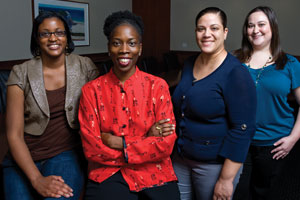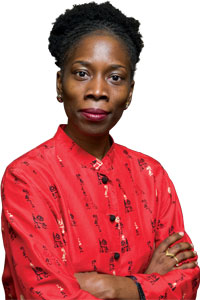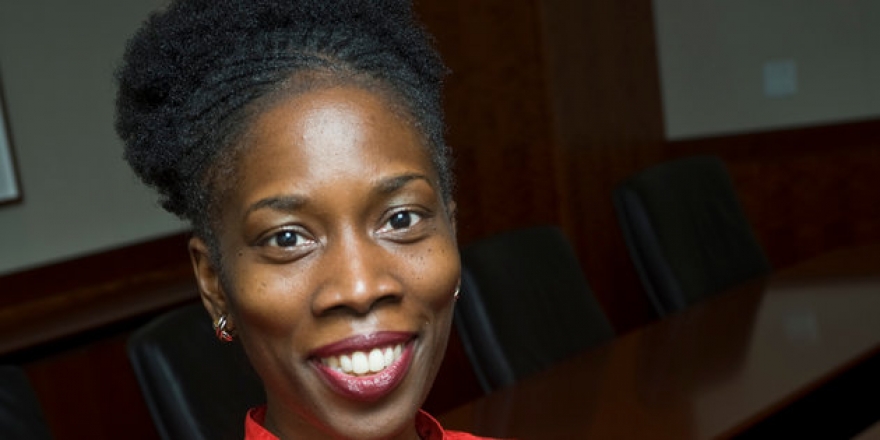Breaking Free
Thema Bryant-Davis reveals how cultural influences impact trauma recovery and offers new paths to healing.
In the wake of trauma, Thema Bryant-Davis and her research students offer new paths to healing.

Trauma occurs everyday in any number of forms, from domestic violence to sexual assault, human trafficking, child abuse, and genocide.
It happens in faraway countries, nearby towns, and even our own homes. Those who suffer these traumas describe them in whispers and hushed tones, while others forge on in silence.
Dr. Thema Bryant-Davis, however, is speaking up. Through GSEP’s Culture and Trauma Research Lab, the psychology professor and her team of graduate research assistants are exploring how an individual’s cultural identity impacts how he or she recovers from trauma.
Consider Karen, one of Bryant-Davis’ clients (whose identity has been protected for this article). While her parents spent most of her childhood in prison, Karen grew up in poverty under her grandmother’s firm and faithful care. When her grandmother passed, teenage Karen became homeless, developed a drug problem, and gave birth to a son. A man invited Karen and her son into his home, but the relationship quickly became abusive. “She felt she deserved it because of the bad life choices she had made,” Bryant-Davis explains.
Eventually Karen admitted that she needed help. “She began to seek out the one source of strength she remembered from her grandmother: the church. Attending church and seeing the condition she and her son were living in—one of constant fear—led to her decision to change her life.” Encouraged by fellow worshippers, Karen got sober and soon took her son to live in a shelter, where they benefited from family and individual counseling. Two years after this decision, Karen is both sober and employed, while her son attends school and is enjoying his childhood.

from left: Shaquita Tillman, Thema Bryant-Davis, Kimberly Smith, Alison Marks
Through the Culture and Trauma Research Lab, Bryant-Davis and her team—clinical psychology doctoral students Alison Marks, Kimberly Smith (MS ’08), and Shaquita Tillman (MA ’07)—examine multiple cases like Karen’s. They look at not only what led Karen to this abusive relationship, but also what factors trapped her in it, like substance abuse and poverty, and those that empowered her to leave, particularly social and spiritual support.
Their research considers the multiple components of a person’s identity—including race, gender, migration status, economics, disability, sexual orientation, religion, and age—as essential and defining elements in how he or she makes sense of tragedy. Bryant-Davis’ book, Thriving in the Wake of Trauma: A Multicultural Guide (Praeger 2005, 2008), was one of the first studies on trauma to consider all these facets of identities on the road to recovery.
The team meets weekly to conduct qualitative and quantitative research for books, articles, and conference presentations. “We’re collecting narratives, having people share their stories, and analyzing those experiences,” Bryant-Davis explains. “We’re also completing critical reviews of literature to see what’s out there about trauma in a particular community.”
The reviews provide health professionals with a snapshot of the client’s cultural context. Marks recently completed a review of Jewish partner abuse, revealing the harsh, cultural stigma a Jewish woman may endure if she speaks out against partner abuse, as well as the uniquely complex nature of securing a divorce.
“Clinicians working with women from intricate or complicated cultures struggle to know what their clients experience,” Marks says. “Understanding the culture comes only from reading the research and learning more about the populations you work with. It’s a disservice not to keep your thumb on the pulse of this information.”
Tillman analyzed literature concerning the barriers faced by African American victims of sexual assault, such as economic dependence on the abuser, shame, self-blame, and distrust of formal agencies caused by past experiences of racial discrimination.
Smith conducted a similar review of sexual assault against girls in South Africa, a nation reported to have one of the world’s highest incidences of rape. She investigated the cultural tradition of female subjugation, corrupt or absent enforcement agencies, and the prevalence of poverty as inhibiting factors for trauma recovery. “The review will be useful for health professionals here in the States who treat a woman from South Africa,” she observes, “as well as for clinicians in South Africa who could benefit from an outside perspective on their culture.” The group also completed a review of rape as a war crime in Africa, an issue that traces back to Bryant-Davis’ earliest scholarly interest in trauma.

Thema Bryant-Davis
As a teenager Bryant-Davis moved across the world from Baltimore, Maryland, to Liberia, Africa. When the country descended into civil war, her family was evacuated. Bryant-Davis witnessed as tragedy struck friends and neighbors, and noticed how few therapists were there to help. It caused her to think about how few people had utilized therapy during her childhood in Baltimore, where individuals faced community and family violence. “The experience of growing up in an inner-city community and living in pre-war Liberia got me thinking about trauma. If we’re not using therapy, what are people doing to heal?”
Some people, research shows, use religious coping strategies: they read holy or inspirational texts, or undergo faith-based counseling with their ministers. Others rely on family and friends, or utilize safe means to express themselves. The Robert Wood Johnson Foundation, which supports the lab along with the Pepperdine University Faculty Scholars Grant, recently funded Bryant-Davis’ pilot study to examine the effectiveness of expressive arts as an alternative healing strategy for ethnically diverse children who have been exposed to partner abuse through their parents. Music, drama, dance, poetry, and visual arts all provide a comforting outlet for pent-up emotions, especially among young ones who may lack the vocabulary and maturity to release their pain through words.
Through the nationwide Fragile Family and Child Well-being Study, Bryant-Davis looks particularly at partner violence in the African American community and strategies for prevention. “Violence is higher in the African American community than most others, but when you control for poverty, that distinction disappears,” Bryant-Davis explains. “Race and income are very much linked. African Americans are more likely to live in persistent poverty, and African American women are at increased risk for homicide by their current or former dating partner. It’s a dangerous situation, and we have to address it with culturally-informed intervention.”
Central to that intervention is the study of “protective factors”—components of a person’s cultural makeup that make them less vulnerable to suffering interpersonal violence. Research shows that educated women, and those who generate and control their own income stream, are less likely to experience partner abuse, as are women who report living in a safe neighborhood. Social support is a protective factor, since abused people are often isolated from others who could help them.
Bryant-Davis also describes the importance of “instrumental social support: having someone in your network who not only supports you emotionally, but can support you with resources. This can be someone who will watch your children or offer you a place to stay for awhile.”
While Karen’s faith and relationship with the church helped her escape an abusive relationship, religiosity does not always protect potential victims. “Church attendance isn’t necessarily going to shield someone from abuse,” Bryant-Davis says. “Religious coping strategies may help to affirm people, but we have to be careful not to promote the idea that if you have enough faith the abusive partner will change. The victim is not responsible for the abuser’s behavior.”
Better understanding of the factors that typically do or do not protect individuals from trauma gives mental health counselors a more effective toolbox for helping them recover. “Prior research had largely assumed that factors in recovery were universal, without taking diversity into account. We’re looking to disseminate information to the scientific community that emphasizes these cultural factors for victims of violence.”
They’ve been successful so far. Findings from the Culture and Trauma Lab have been presented at the annual conventions of the American Psychological Association, International Society for Traumatic Stress Studies, Association of Women in Psychology, the National Summit on Interpersonal Violence, the National Scientific Meeting on Sexual Assault, and the Multicultural Summit.
Armed with research on cultural context, professionals are beginning to provide more useful treatment and guidance. For example, women in a physically or emotionally abusive relationship are more likely to report heavy drinking or substance abuse. “It’s interesting to think through policy for a hospital,” Bryant-Davis says. “It’s easy to say ‘stop using drugs,’ but if you just focus on that, you may miss what’s making them use this coping mechanism in the first place. Excessive behavior is a sign of a bigger problem; it’s self-medicating.”
The team’s ultimate goal is to give health professionals the proper information and skills to help their clients not just recover, but thrive. “The concept of ‘thriving’ is a step beyond survival,” Bryant-Davis notes. “With clients and research participants I look at stopping negative symptoms, but also getting people to a place where they can welcome their potential, their purpose. Too often in recovery people go merely from being a victim to surviving. Our research helps them go one step further.” ′
